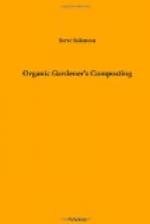Incidentally, Lane County understands that many gardeners don’t have pickup trucks. They reasonably offer to deliver their compost for a small fee if at least one yard is purchased. Other local governments also make and deliver yard waste compost.
So what about your own home compost? If you are a flower, ornamental, or lawn grower, you have nothing to worry about. Just compost everything you have available and use all you wish to make. If tilling your compost into soil seems to slow the growth of plants, then mulch with it and avoid tilling it in, or adjust the C/N down by adding fertilizers like seed meal when tilling it in.
If you are a vegetable gardener and your compost doesn’t seem to provoke the kind of growth response you hoped for, either shallowly till in compost in the fall for next year’s planting, by which time it will have become stable humus, or read further. The second half of this book contains numerous hints about how to make potent compost and about how to use complete organic fertilizers in combination with compost to grow the lushest garden imaginable.
CHAPTER FOUR
All About Materials
In most parts of the country, enough organic materials accumulate around an average home and yard to make all the compost a backyard garden needs. You probably have weeds, leaves, perhaps your own human hair (my wife is the family barber), dust from the vacuum cleaner, kitchen garbage and grass clippings. But, there may not be enough to simultaneously build the lushest lawn, the healthiest ornamentals and grow the vegetables. If you want to make more compost than your own land allows, it is not difficult to find very large quantities of organic materials that are free or cost very little.
The most obvious material to bring in for composting is animal manure. Chicken and egg raisers and boarding stables often give manure away or sell it for a nominal fee. For a few dollars most small scale animal growers will cheerfully use their scoop loader to fill your pickup truck till the springs sag.
As useful as animal manure can be in a compost pile, there are other types of low C/N materials too. Enormous quantities of loose alfalfa accumulate around hay bale stacks at feed and grain stores. To the proprietor this dusty chaff is a nuisance gladly given to anyone that will neatly sweep it up and truck it away. To the home gardener, alfalfa in any form is rich as gold.
Some years, rainy Oregon weather is still unsettled at haying season and farmers are stuck with spoiled hay. I’m sure this happens most places that grass hay is grown on natural rainfall. Though a shrewd farmer may try to sell moldy hay at a steep discount by representing it to still have feed value, actually these ruined bales must be removed from a field before they interfere with working the land. A hard bargainer can often get spoiled hay in exchange for hauling the wet bales out of the field




